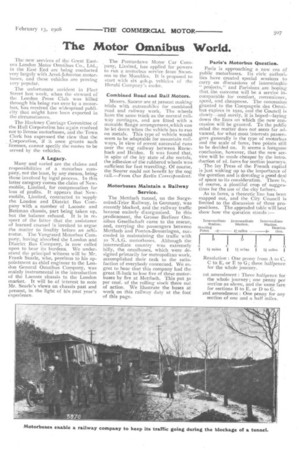The Motor Omnibus World.
Page 7

If you've noticed an error in this article please click here to report it so we can fix it.
The new services of the Great Eastern London Motor Omnibus Co., Ltd., in the _East End are being conducted very largely with Arrol-Johnston motorbuses, and these vehicles are. proving very popular.
The unfortunate accident in Fleet Street last week, when the steward of the London Press Club was killed through his being run over by a motorbus, has received the widespread publicity that might have been expected in the circumstances.
The Hackney Carriage Committee of the Hull Corporation has again resolved not to license motorbuses, and the Town Clerk has expressed the view that the . Corporation, if it once grants such licenses, cannot specify the routes to be served by the vehicles.
A Legacy.
Many and varied are the claims and responsibilities of a motorbus company, not the least, by any means, being those involved by legal process. In this latter category comes the claim of Newmobile, Limited, for compensation for loss of profits. It .appears that Newmobile, Limited, contracted to 'supply the London and District Bus Company with a number of Lacoste and Bagman chassis, part being taken up, but the balance refused. It is in respect of the latter that the assistance of learned counsel is invoked to argue the matter to finality before an arbitrator. The Vanguard Motorbus Company, haying absorbed the London and District Bus Company, is now called upon to bear its burdens. We understand the principal witness will be Mr. Frank Searle, who, previous to his appointment as chief engineer to the London General Omnibus Company, was mainly instrumental in the introduction of the Lacoste chassis to the London market. It will be of interest to note Mr. Searle's views on chassis past and present, in the light of his past year's experience.
The Pontardawe Motor Car Company, Limited, has applied for powers to run a motorbus service from Swansea to the Mumbles. It is proposed to start with six 4oh.p. vehicles of the Herald Company's make.
Combined Road and Rail Motors.
Messrs. Saurer are at present making trials with automobiles for combined road and railway work. The wheels have the same track as the normal railway carriages, and are fitted With a movable flange arrang-ement,which can be let down when the vehicle has to run on metals. This type of vehicle would seem to be adaptable for mountain railways, in view of recent sUccessful runs over the cog railway between Rorschach and Heiden. It was found that, in spite of the icy state of .the metals, the adhesion of the rubbered wheels was sufficient for fast travelling. Of course, the Saucer could not benefit by the cog rail—From Our Berlin Correspondent_ Motorbuses Maintain a Railway Service.
The Mettlach tunnel, on the Sargemtind-Trier Railway, in Germany, was recently blocked, and the railway traffic became entirely disorganised. In this predicament, the Grosse Berliner Omnibus Gesellschaft came to the rescue, and, carrying the passengers between Mettlach and Ponten-Besseringen, succeeded in maintaining the traffic with in N.A.G. motorbuses, Although the intermediate country was extremely hilly, the omnibuses, which were designed primarily for metropolitan work, accomplished their task to the satisfaction of everybody concerned. We regret to hear that this company had the great ill-luck to lose five of these motorbuses by fire at Mettlach. This put 50 per cent. of the rolling stock there out of action. We illustrate the buses at work on this railway duty at the foot of this page. Paris's Motorbus Question.
Paris is approaching a new era of public motorbuses. Its civic authorities have created special sessions to carry on discussions of interminable " projects," and parisians. are hoping that the outcome. will be a service incomparable for comfort, convenience, speed, and cheapness. The concession granted to the Compagnie .des Omnibus expires in 1910, and the Council is slowly—and surely, it is hoped—laying clown the lines on Which the new concession will be granted. To the public mind the matter does not seem far advanced, for what most interests passengers generally is the type of motorbus and the scale of fares, two points still to be decided on. It seems a foregone conclusion, however, that the new service will be made cheaper by the introduction of Id. fares for section journeys.
The lay Press of the French capital is just waking up to the impcaiance of the question and is devoting a good deal of space to its consideration.' There is, of course, a plentiful crop of suggestions for the use of the city fathers.
As to fares,a theoretic line has been mapped out, and the City Council is limited to the discussion of three propositions. The appended table will best show how the question stands :—




















